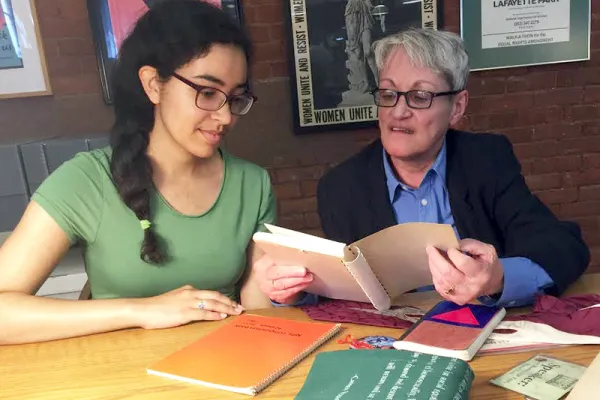Hands-On History: Students Help Shape Smith’s New MOOC on Political Activism
Campus Life

Published June 6, 2016
While she enjoyed studying the life of Gloria Steinem ’56 in psychology professor Lauren Duncan’s seminar in 2015, Smith senior Elizabeth Gooen never thought she’d have a chance to meet the feminist leader in person.
But that’s just what happened in March, when Gooen and other Smithies involved in creating the college’s first MOOC had a chance to talk with Steinem over dinner at President Kathleen McCartney’s house.
When Gooen, a government major at Smith, reached out to Steinem at the start of her research on the feminist icon for Duncan’s Psychology of Political Activism seminar, she hoped for some email communication with Steinem. Instead, President McCartney invited Gooen and other student creators of the MOOC to dinner with the renowned alumna.
“Talking to Gloria Steinem was incredible, not only because she’s been a personal hero of mine since middle school, but also because I developed a connection to her through the research I did in class,” Gooen says.
Smith’s first MOOC is based on Duncan’s seminar on the Psychology of Political Activism.
The new online course—which launched in March with nearly 6,000 registered participants—features the work of a group of Smith students who began creating materials for the MOOC last year while enrolled in Duncan’s class.
The course materials focus on the lives and work of nine women activists from various fields whose papers are housed in Smith’s Sophia Smith Collection. Each student was assigned an activist from a list that included Steinem and women’s health activist Loretta Ross, among others. The Smith students then delved into oral histories and other archival documents about those women, relating the activists’ life stories to psychological theories the MOOC is designed to explore.
Duncan says her seminar students were “instrumental” in curating materials for the MOOC. “As far as we know, this is the first and only MOOC that relies heavily upon student-created content,” she notes.
Duncan says student work on the MOOC continued this past semester, with her seminar students serving as discussion moderators for the new online course. “Each student has become an expert on her activist,” Duncan says.
One of those experts is psychology major Alicia Bowling ’17, who worked extensively on the MOOC last summer after completing Duncan’s seminar. In class, Bowling studied activist Luz Alvarez Martinez, who co-founded the National Latina Health Organization in 1986.
“I didn’t know anything about her before the class,” Bowling says. “During the seminar and in my summer work, I was able to explore the ongoing political movements that were happening during her life.”
Bowling’s work on the MOOC last summer also involved editing and adapting class projects—including her own—into usable course materials for the online class.
“My job was to transform everyone’s projects so that they could be used as learning tools, instead of end products that showed one person’s impression as a student in a class,” Bowling explains.
Working on the MOOC was challenging and rewarding, Bowling says. The hardest part was adapting course materials while maintaining the activists’ original opinions and theories.
“I was determined to represent each activist as best as I could while keeping in mind her beliefs and motivations,” Bowling says. “I felt it was my duty to do them justice.”
Bowling also got to meet most of the activists featured in the MOOC when they visited campus to review their materials for the course.
“I got to hear firsthand about their experiences, including what wasn’t covered in their oral histories,” Bowling says. “So much has happened over the years, and there are things that weren’t necessarily captured in previous interviews.”
Students say Smith was an ideal place for the new MOOC because the college and the course emphasize women’s accomplishments and contributions to various fields and causes.
“I like to think of the MOOC as a very active resistance against the status quo because it’s centered on women’s history,” Bowling says, adding that many of the activists featured in the course are women of color.
Gooen says working on the course gave her new insight “into the people around me.”
“Smith is filled with activists, and the theories we were learning about really helped put Smithie activism into a broader context,” she says.
For more information about the Psychology of Political Activism MOOC, email smithx@smith.edu.
Alicia Bowling ’17 (left) and activist Carmen Vazquez, who is featured in Smith's new MOOC, review materials Vazquez donated to Smith's Sophia Smith Collection.